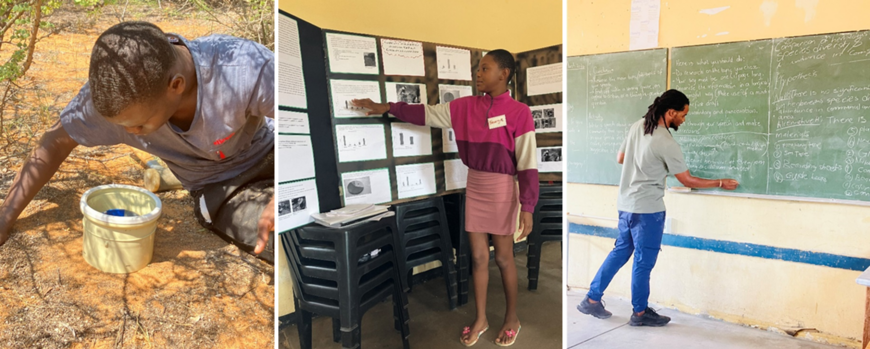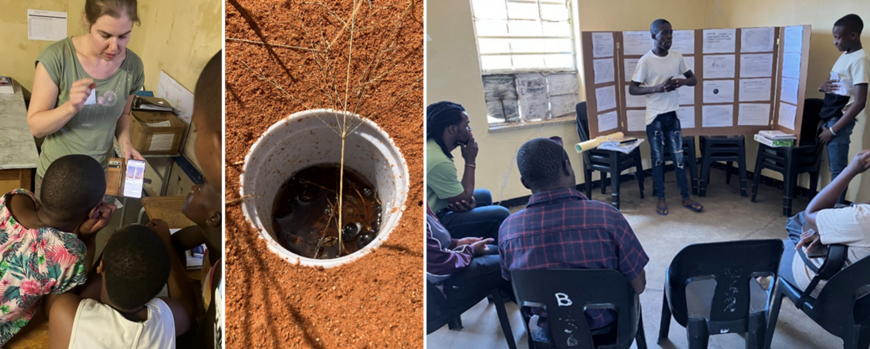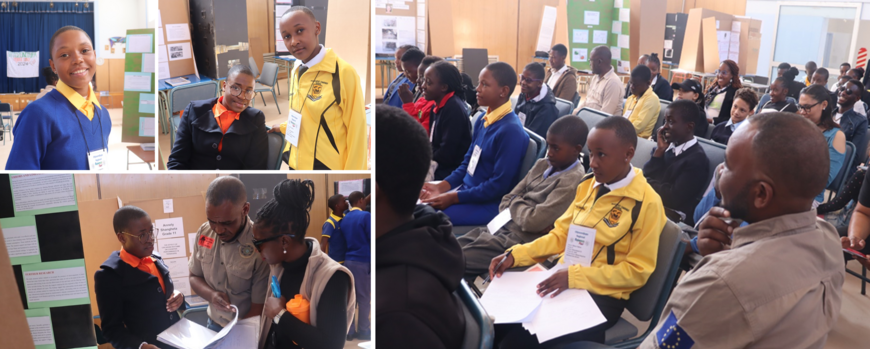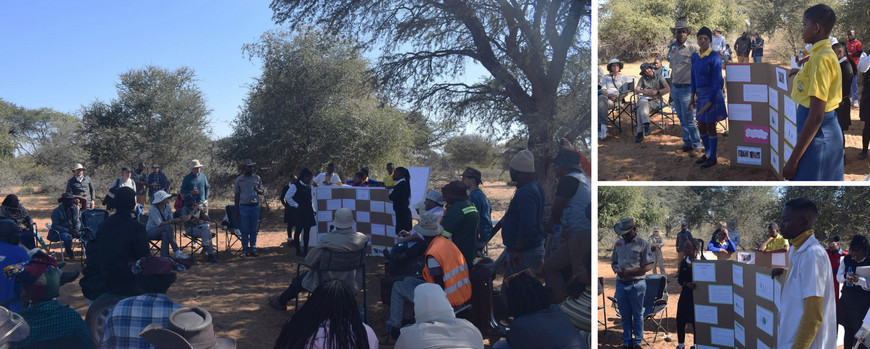Knowledge transfer: Educational activities by EduVentures
EduVentures plays a crucial role in the NamTip project by focusing on raising awareness about Desertification Tipping Points (DTPs) through hands-on education and research initiatives. Here’s an overview of their contributions across the two project phases:
Phase I: Development and implementation of educational modules
In the first project phase, EduVentures developed and refined four key educational modules centered on addressing DTPs in Namibia. These modules included:
- Introduction to Climate Change and DTPs in Namibia;
- Understanding Ecological and Social Drivers of DTPs;
- Impacts of DTPs;
- Managing DTPs.
After finalizing the modules, they were reviewed by NamTip scientists to ensure accuracy and relevance. Following this, EduVentures conducted a pre-visit to five schools (Okakarara SSS, Waterberg JSS, Coblenz CS, Okamatapati CS, and Okondjatu CS) to select participating learners. During this phase, 500 learners and 25 teachers were engaged across these schools.
Subsequently, a series of school visits were organized, where these modules were delivered over five days at each school. The program was conducted in the Ombombo Mobile Classroom and was enriched with excursions and interactive activities, making the learning experience both engaging and educational for the students.
Phase II: Research camp and science fair competition
In the second project phase, EduVentures carried out several key activities:
1. School visits (February-March 2024):
EduVentures revisited the five schools in the Greater Waterberg Region to educate 150 learners and 10 teachers about desertification tipping points. These visits also served to select and prepare 20 learners for participation in a science fair research camp.
2. Research camp (March-April 2024):
A research camp was held at Waterberg Junior Secondary School, where learners received specialized training in scientific research methods. Activities included data collection at Farm Hamakari and Okambukonde, in collaboration with NamTip scientists. Learners worked on previously jointly selected research projects such as:
- Comparison of different water filtering techniques using soil;
- Measuring plant biomass using drone imagery;
- Comparison of herbaceous species diversity and abundance in commercial versus communal areas;
- Comparison of invertebrate diversity and abundance in commercial versus communal areas;
- Comparison of water infiltration rates in commercial and communal soil types.
Throughout the camp, NamTip scientists provided extensive guidance, helping learners with research planning, data collection, and analysis.
3. Science fair competition (July 2024):
One learner from each school was selected to represent their institution at the Regional Science Fair Competition in Otjozondjupa. The project on "Comparison of invertebrate diversity and abundance in commercial versus communal areas" won a silver medal. While no projects advanced to the National Science Fair, the competition provided valuable experience in scientific methods, data collection, and report writing.
4. Future presentations:
Learners will continue to present their projects at various events, including farmers' days, to raise awareness about desertification tipping points in the study area.
Phase III: Presentations at NamTip Final Meeting
As part of the learners' presentations to the community, EduVentures mobilized and mentored eight learners in preparation for the NamTip Final Meeting held on 23–24 June 2025. Learners from Okakarara Secondary School, Waterberg Secondary School, Coblenz Combined School, and Okamatapati Combined School took part in the initiative, while Okondjatu Combined School could not participate as their selected learners had already left the school. EduVentures guided the learners through preparation sessions focused on structuring their research into clear presentations, strengthening public speaking and teamwork skills, and connecting local environmental issues with broader scientific perspectives.
During the NamTip Stakeholder Workshop in Okakarara (23 June), the learners introduced their projects to NamTip scientists and invited guests, receiving constructive feedback. The following day, they presented their work to community members and scientists at the communal village of Ozongarangombe, highlighting the relevance of their projects to local climate change adaptation efforts. The presentations were well-received for their clarity and relevance, strengthening collaboration between youth, communities, and scientists, and fostering a shared understanding of environmental challenges and sustainable solutions.
Learners also featured on NBC Otjiherero National Radio, where they shared their experiences and perspectives on climate change, extending their message to a wider audience and inspiring peers across Namibia.
Impact and Future Outlook
EduVentures' involvement in the NamTip project has successfully engaged learners in practical scientific research and environmental awareness initiatives. By combining education with hands-on experience, they have empowered learners to contribute meaningfully to the understanding and management of desertification in Namibia. The knowledge and skills gained through these activities will continue to benefit the participants and their communities in the future.




